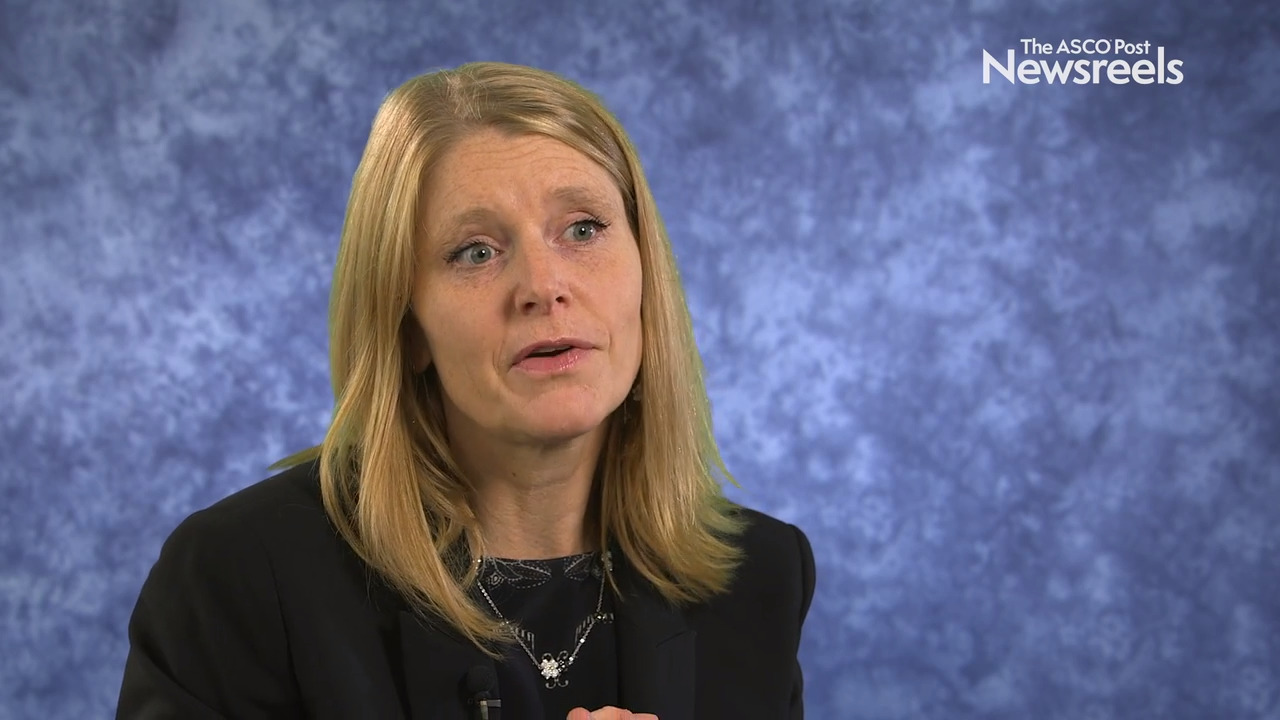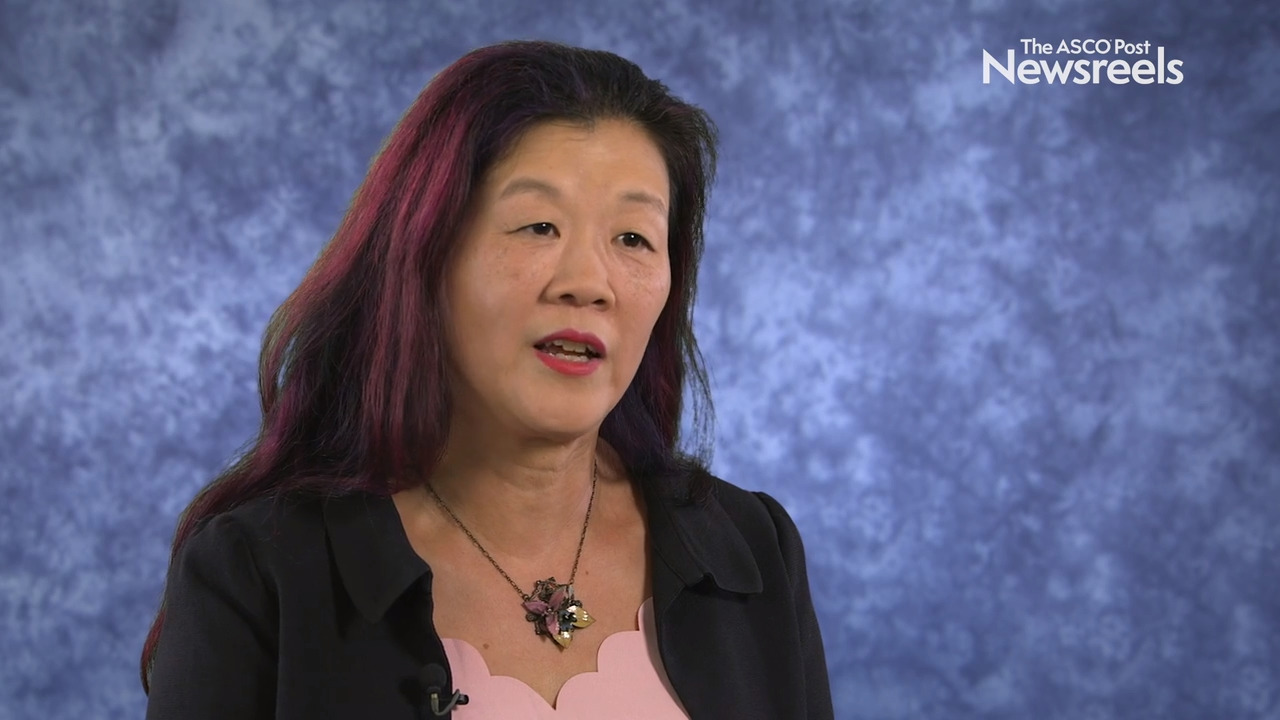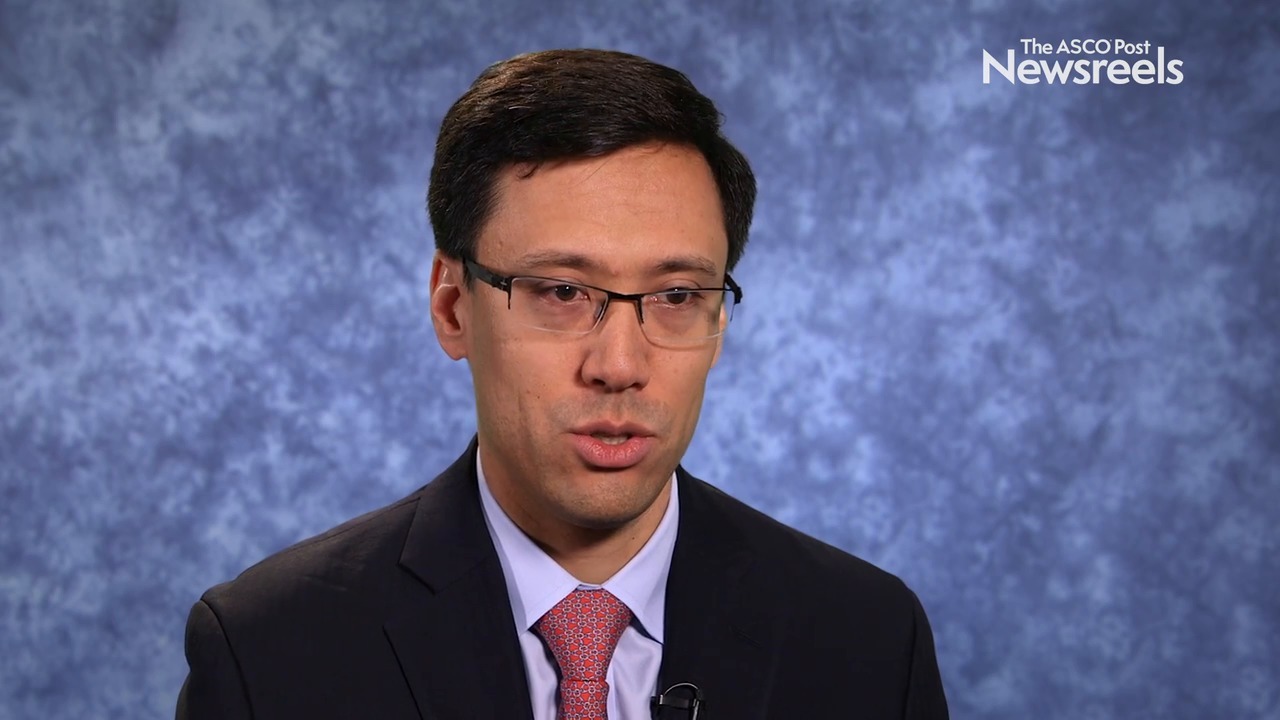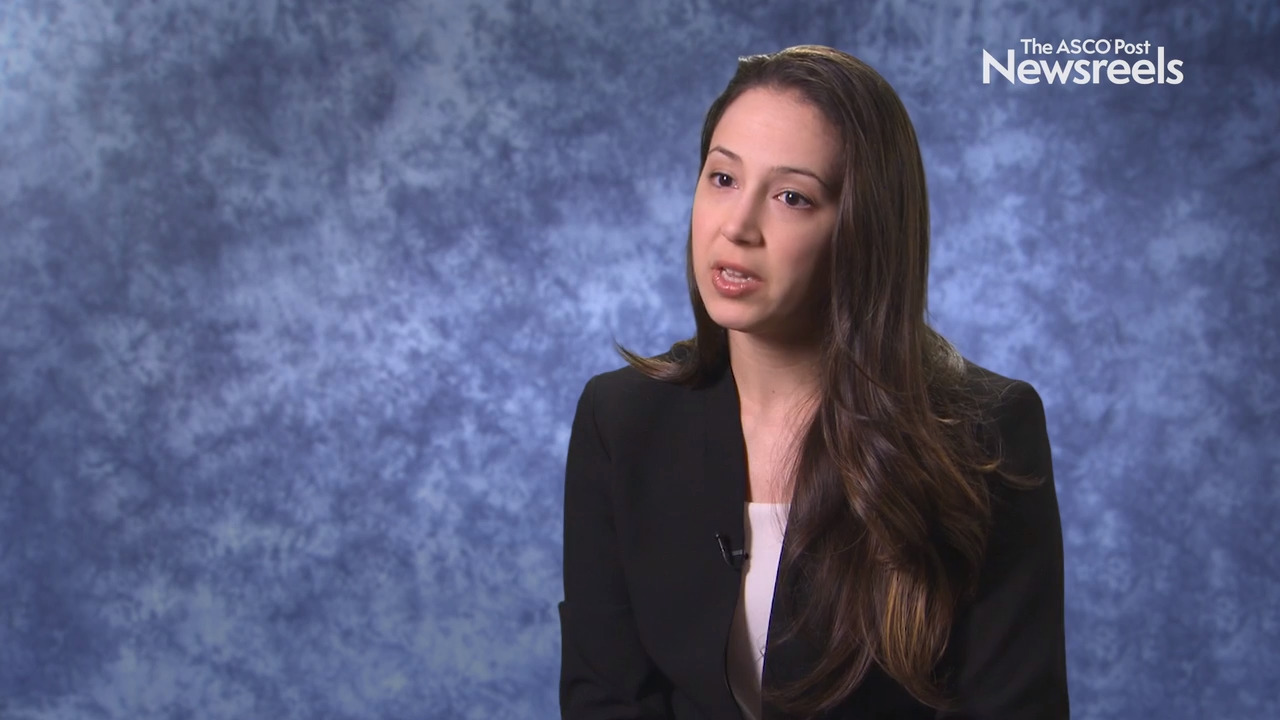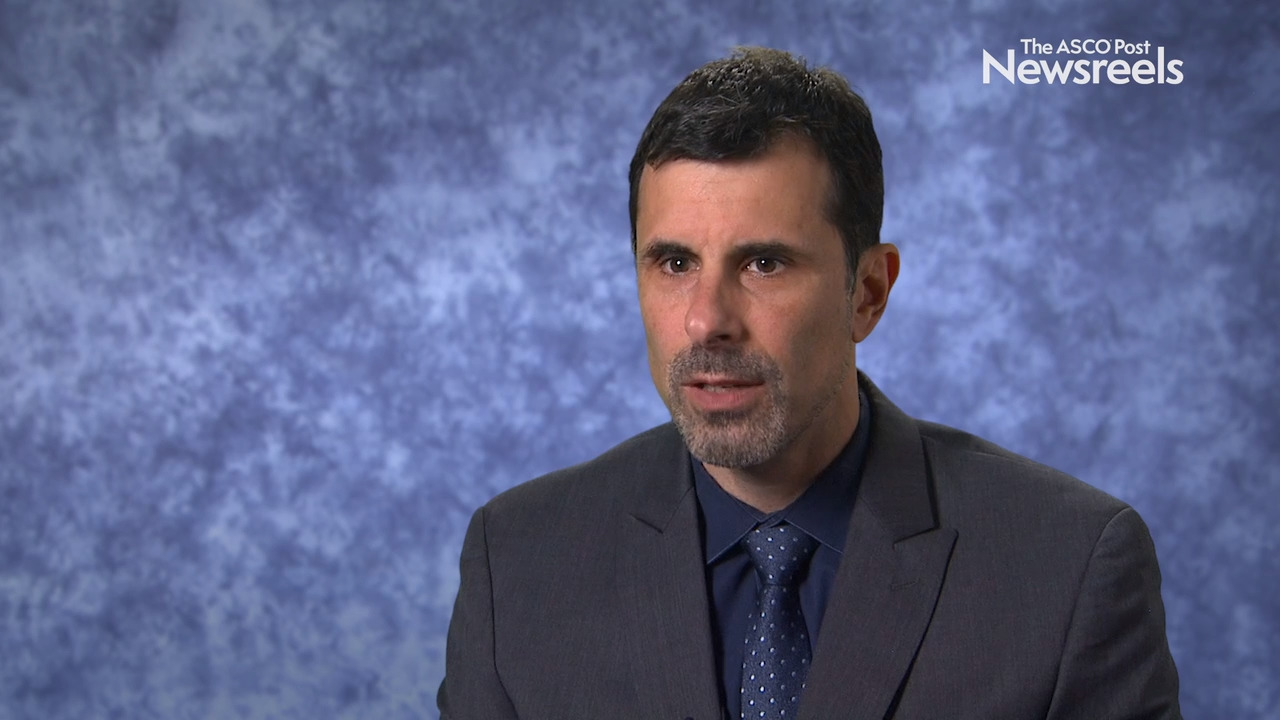Selpercatinib: Precision Medicine for RET Fusion–Positive NSCLC
Selpercatinib (LOXO-292), a RET kinase inhibitor, demonstrated antitumor activity in the lungs and brain and durable responses with acceptable tolerability in patients with RET fusion–positive non–small cell lung cancer (NSCLC), according to an updated analysis of the LIBRETTO-001 registration...
Expert Point of View: Myung-Ju Ahn, MD, and Roy Herbst, MD, PhD
Formal discussant Myung-Ju Ahn, MD, of Samsung Medical Center Sungkyunkwan University, Seoul, South Korea, said that the CASPIAN results were similar to those of IMpower133, which found that the addition of the immune checkpoint inhibitor atezolizumab to etoposide/carboplatin significantly...
Novel KRAS Inhibitor Shows Activity in Early Study of Advanced Non–Small Cell Lung Cancer
The investigational KRAS inhibitor AMG 510 yielded clinical activity in patients with advanced non–small cell lung cancer (NSCLC), according to updated results of a small ongoing phase I trial reported at the 2019 International Association for the Study of Lung Cancer (IASLC) World Conference on...
Studies Report Prolonged Long-Term Survival With Immunotherapy vs Chemotherapy in Advanced NSCLC
Longer-term follow-up of patients with advanced non–small cell lung cancer (NSCLC) who are treated with immunotherapy have appreciably extended survival at 5 years, suggesting that for some patients, this disease can be managed as a chronic condition. These findings are based on two presentations ...
Suresh S. Ramalingam, MD, on Osimertinib vs Comparator EGFR TKI in EGFR-Mutated NSCLC: The FLAURA Trial
Suresh S. Ramalingam, MD, of Emory University, discusses results from the final overall survival analysis of the phase III FLAURA trial in EGFR-mutated advanced non–small cell lung cancer, which showed that osimertinib provided a survival benefit vs comparator EGFR tyrosine kinase inhibitor therapy in the first-line setting (Abstract LBA5).
Solange Peters, MD, PhD, on NSCLC: CheckMate 227 Trial of Nivolumab/Ipilimumab vs Chemotherapy
Solange Peters, MD, PhD, of the Oncology Department of CHUV, discusses study findings from the first phase III trial to show PD-1 and CTLA-4 inhibition is effective in non–small cell lung cancer, with improved overall survival vs chemotherapy (Abstract LBA4).
ESMO 2019: ASCEND-7: Ceritinib for Patients With ALK-Positive NSCLC Metastatic to the Brain
Patients with ALK-positive non–small cell lung cancer (NSCLC) that was metastatic to the brain at baseline demonstrated whole-body, intracranial, and extracranial responses following treatment with ceritinib, according to findings from the phase II ASCEND-7 study presented by Chow et al at the...
Laura Q.M. Chow, MD, on Metastatic NSCLC: Results of the ASCEND-7 Trial on Ceritinib
Laura Q.M. Chow, MD, of the University of Texas at Austin, Dell Medical School and LIVESTRONG Cancer Institutes, discusses phase II study findings that showed the ALK inhibitor ceritinib achieved durable intracranial response in patients with ALK-positive non–small cell lung cancer that has spread to the brain (Abstract 1478O).
Differences By Sex in Lung Cancer Incidence and Mortality: What Is Known, and What Does It Mean?
The finding that women have a higher incidence of lung cancer than men of the same age and with the same smoking history was unexpected when it first emerged from studies in the 1990s. Just as unexpected was a subsequent finding. Even with their higher risk, women have a lower mortality and higher...
Lung Disease Associated With E-Cigarette Use
On September 12, 2019, the Centers for Disease Control and Prevention (CDC) announced the updated number of confirmed and probable cases of lung disease associated with e-cigarette product use, or vaping. The new case count is the first national aggregate based on the new CDC case definition...
AACR Disparities: Uninsured/Underinsured, Lower-Income, and/or Minority Patients More Likely to Receive Cancer Diagnosis After ED Visit
Medicare patients from lower socioeconomic groups and several ethnic minority groups were more likely to be diagnosed with cancer following an emergency department visit, according to results of a study presented at the 12th American Association for Cancer Research Conference on The Science of...
Andreas Rimner, MD, on the PACIFIC Trial: Durvalumab for Stage III NSCLC
Andreas Rimner, MD, of Memorial Sloan Kettering Cancer Center, discusses study findings showing that, for patients with stage III non–small cell lung cancer, durvalumab reduced the rate of and time to disease progression vs placebo and also reduced the number of new distant lesions (Abstract LBA6).
Expert Point of View: Alex A. Adjei, MD, PhD
Alex A. Adjei, MD, PhD, of Mayo Clinic, Rochester, Minnesota, who was not involved in KEYNOTE-189 or KEYNOTE-021, provided some perspective on the exploratory analyses of tumor mutational burden from these and other studies. “Four studies at this meeting presented data on tumor mutational burden...
ASTRO 2019: Patterns of Disease Progression in Patients With Unresectable Stage III NSCLC: Analysis of the PACIFIC Trial
Andreas Rimner, MD, of Memorial Sloan Kettering Cancer Center, presented an update of the landmark PACIFIC trial at the 61st Annual Meeting of the American Society for Radiation Oncology (ASTRO) (Abstract LBA-6). In earlier reports from the randomized phase III trial, Antonia et al had evaluated...
ASTRO 2019: SBRT After Disease Progression on Immunotherapy Increases PFS in Patients With Metastatic NSCLC
Non–small cell lung cancer (NSCLC) accounts for the vast majority of all lung cancers—between 80% and 85% of those diagnosed in the United States—and is among the most deadly cancers for both men and women, exceeding the mortality rate of colon, breast, and pancreatic cancers combined. The results...
FDA Pipeline: Breakthrough Therapy Designation in Lung Cancer, Orphan Drug Designations in Myeloma and Soft-Tissue Sarcoma
Recently, the U.S. Food and Drug Administration (FDA) granted Breakthrough Therapy designation to tepotinib for metastatic non–small cell lung cancer harboring MET exon 14 skipping alterations, and Orphan Drug designations to novel chimeric antigen receptor T-cell therapies in both multiple myeloma ...
WCLC 2019: Video-Assisted Thoracic Surgery vs Open Surgery in Lung Cancer
Video-assisted thoracic surgery was associated with lower in-hospital complications and a shorter length of stay compared with open surgery among British patients who were diagnosed with early-stage lung cancer, according to research presented by Lim et al at the International Association for the...
WCLC 2019: Selpercatinib in RET Fusion–Positive NSCLC
Patients with RET fusion–positive non–small cell lung cancer (NSCLC) comprise up to 2% of all NSCLC cases, but there are no targeted therapies currently approved for patients with this form of lung cancer. Selpercatinib (also known as LOXO-292) is an oral and highly selective investigational drug...
WCLC 2019: KEYNOTE-024 Survival Update Shows Benefit With Pembrolizumab vs Chemotherapy in Advanced NSCLC
First-line pembrolizumab monotherapy provides durable long-term overall survival benefit compared to chemotherapy in patients with advanced non–small cell lung cancer (NSCLC), according to data from the KEYNOTE-024 trial presented by Martin Reck, MD, PhD, at the International Association for the...
WCLC 2019: Final Overall Survival Results of IMpower131 Trial in Advanced Squamous NSCLC
Patients with stage IV squamous non–small cell lung cancer (NSCLC) with high programmed cell death ligand 1 (PD-L1) expression treated with atezolizumab and chemotherapy experienced longer overall survival rates than those treated with chemotherapy alone. The data from the IMpower131 trial were...
WCLC 2019: BioMILD Trial of Blood MicroRNA Plus Low-Dose CT to Reduce CT Repeats in Lung Cancer Screening
Researchers from Milan reported that using a blood microRNA assay accompanied by low-dose computed tomography (CT) screening is safe and effective in screening patients for lung cancer. The results were shared at the International Association for the Study of Lung Cancer (IASLC) 2019 World...
WCLC 2019: Autoantibody Diagnostic Test Followed by CT Imaging May Improve Diagnosis, Reduce Mortality in Lung Cancer
A combination of the EarlyCDT-Lung Test followed by computed tomography (CT) imaging in Scottish patients at risk for lung cancer resulted in a significant decrease in late-stage diagnosis of lung cancer and may decrease lung cancer–specific mortality, according to research presented at...
Cristina Merkhofer, MD, MHS, on NSCLC: Survival Impact of Taking Part in a Clinical Trial
Cristina Merkhofer, MD, MHS, of Fred Hutchinson Cancer Research Center, discusses study results showing that for patients with metastatic non–small cell lung cancer at her institution, enrolling in a therapeutic drug clinical trial was associated with a 47% lower risk of death, compared with not taking part in a trial (Abstract 137).
Bernardo H.L. Goulart, MD, on Stage IV NSCLC: High Drug Costs May Affect Survival
Bernardo H. L. Goulart, MD, of Seattle Cancer Care Alliance, discusses his findings that high out-of-pocket costs for oral tyrosine kinase inhibitors may lower survival rates, shorten the duration of therapy, and reduce the number of prescriptions for patients with metastatic EGFR- or ALK-positive non–small cell lung cancer (Abstract 3).
WCLC 2019: Screening Efficacy of PLCOm2012 vs USPSTF Criteria
Researchers reported that a prospective trial comparing two screening methods for patients at risk of developing lung cancer found that a model used by Canadian, Australian, and European public health organizations detected more cancers than the screening model used by the United States Preventive...
WCLC 2019: Survey Findings on Evidence-Based Guidelines for Molecular Testing in Lung Cancer
One-third of those who responded to a survey reported they are unaware of evidence-based guidelines that support the use of molecular testing in lung cancer, according to results from the International Association for the Study of Lung Cancer (IASLC) Global Survey on Molecular Testing in Lung...
WCLC 2019: CASPIAN Trial Finds Addition of Durvalumab to Chemotherapy Improves Overall Survival in Patients With Extensive-Stage SCLC
The addition of durvalumab to chemotherapy improved overall survival in patients with extensive-stage small cell lung cancer (SCLC), according to research presented at the International Association for the Study of Lung Cancer (IASLC) 2019 World Conference on Lung Cancer (WCLC) (Abstract PL02.11)....
WCLC 2019: Pooled Analysis of CheckMate 017 and 057: 5-Year Outcomes With Nivolumab vs Docetaxel in Previously Treated NSCLC
Pooled data on two clinical trials demonstrated patients with previously treated non–small cell lung cancer (NSCLC) treated with nivolumab had a greater than fivefold increase in 5-year overall survival rate compared to treatment with the chemotherapy docetaxel. Scott Gettinger, MD, of Yale...
FDA Approves Entrectinib for NTRK-Fusion Cancers, ROS1-Positive NSCLC
On August 15, the U.S. Food and Drug Administration (FDA) granted accelerated approval to entrectinib (Rozlytrek) for adult and adolescent patients whose cancers have an NTRK (neurotrophic tyrosine receptor kinase) genetic fusion and for whom there are no effective treatments. Entrectinib was also...
The Mark Foundation Awards $6 Million Grant for Lung Cancer Research
The Mark Foundation for Cancer Research has awarded a 3-year $6 million grant to support a new phase of discovery for a team of investigators developing, optimizing, and integrating targeted therapies and immunotherapies to improve outcomes for patients with the most common—and most difficult to...
WCLC 2019: Safety and Toxicity of AMG 510 for KRAS G12C–Mutated, Advanced NSCLC
In a clinical trial testing the toxicity of a KRAS inhibitor, the treatment demonstrated early promising antitumor activity and few adverse side effects in patients with advanced non–small cell lung cancer (NSCLC) harboring a KRAS G12C mutation. The research was presented by Govindan et al at the...
WCLC 2019: First-Line Nivolumab/Ipilimumab in Special Populations With NSCLC
First-line therapy consisting of nivolumab plus ipilimumab showed a consistent safety profile in special populations with advanced non–small cell lung cancer (NSCLC), according to research presented by Fabrice Barlesi, MD, PhD, of Aix-Marseille University, Assistance Publique Hôpitaux de Marseille...
WCLC 2019: Two Studies Show Tumor Mutational Burden Not Associated With Pembrolizumab Efficacy in NSCLC
At the International Association for the Study of Lung Cancer (IASLC) 2019 World Conference on Lung Cancer (WCLC), two presentations showed that tumor mutational burden is not associated with the efficacy of pembrolizumab in combination with chemotherapy in patients with non–small cell lung cancer...
FDA Pipeline: Fast Track Designation in Myelodysplastic Syndrome and AML, Plus Multiple Breakthrough Designations
Recently, the U.S. Food and Drug Administration (FDA) granted Fast Track designation to magrolimab in myelodysplastic syndrome and acute myeloid leukemia (AML). The agency also granted Breakthrough Therapy designations in lung cancer and desmoid tumors, as well as Breakthrough Device designations...
Does the Addition of Bevacizumab to Erlotinib in Advanced EGFR-Mutant NSCLC Improve PFS?
In a phase II trial reported in JAMA Oncology, Thomas E. Stinchcombe, MD, and colleagues found that the addition of bevacizumab to erlotinib did not significantly improve progression-free survival (PFS) in patients with advanced EGFR-mutant non–small cell lung cancer (NSCLC). Study Details The...
2019 Quality Care: Clinical Trial Enrollment May Be Associated With Reduced Mortality in Patients With Metastatic Lung Cancer
Researchers from the University of Washington and Fred Hutchinson Cancer Research Center in Seattle investigated the relationship between participation in a clinical trial and overall survival in patients with advanced non–small cell lung cancer (NSCLC). Cristina Merkhofer, MD, MHS, will present...
Optimal First-Line Therapy for Stage IV Non–Small Cell Lung Cancer: Immunotherapy Alone or With Chemotherapy?
Recent studies in non–small cell lung cancer (NSCLC) have shown benefit for combining checkpoint inhibitors with chemotherapy. Should combinations, therefore, be the first choice for treating patients with newly diagnosed stage IV disease? Two lung cancer experts debated this point at the 2019...
Addition of Pemetrexed/Carboplatin to Gefitinib in Advanced EGFR-Mutant NSCLC
In an Indian single-center phase III trial reported in the Journal of Clinical Oncology, Noronha et al found that the addition of pemetrexed/carboplatin to gefitinib improved progression-free and overall survival in first-line treatment of advanced EGFR-mutant non–small cell lung cancer...
Long-Term Follow-up of Patients With Melanoma, Kidney Cancer, and Lung Cancer Receiving Nivolumab
As reported by Suzanne L. Topalian, MD, and colleagues in JAMA Oncology, long-term follow up of patients from a phase I expansion cohort study indicated 5-year overall survival rates of 34.2%, 27.7%, and 15.6% among patients who received nivolumab monotherapy for advanced melanoma, renal cell...
Atezolizumab Plus Chemotherapy and Bevacizumab in First-Line Treatment of Metastatic Lung Cancer
In late 2018, atezolizumab was approved for use in combination with bevacizumab, paclitaxel, and carboplatin for the first-line treatment of patients with metastatic nonsquamous non–small cell lung cancer (NSCLC) with no EGFR or ALK genomic tumor aberration.1,2 Supporting Efficacy Data Approval was ...
Pooled Analysis of 4-Year Survival With Nivolumab Therapy in Patients With Previously Treated Advanced NSCLC
In an analysis reported in The Lancet Oncology, Antonia et al identified long-term survival rates with nivolumab therapy in patients with previously treated advanced non–small cell lung cancer (NSCLC). The pooled analysis included data from the CheckMate 017, 057, 063, and 003 trials, each...
FDA Approves Entrectinib for NTRK-Fusion Cancers, ROS1-Positive NSCLC
Today, the U.S. Food and Drug Administration (FDA) granted accelerated approval to entrectinib (Rozlytrek) for adult and adolescent patients whose cancers have an NTRK (neurotrophic tyrosine receptor kinase) genetic fusion and for whom there are no effective treatments. Entrectinib was also...
Olaparib/Temozolomide Shows Activity in Patients With Relapsed Small Cell Lung Cancer
Small cell lung cancer accounts for approximately 15% of all lung cancers and has high metastatic potential and poor clinical outcomes. While untreated small cell lung cancers are usually highly sensitive to cytotoxic chemotherapy—with response rates of between 50% and 70%—patients...
Addition of Cediranib to Cisplatin/Pemetrexed in Chemotherapy-Naive Unresectable Malignant Pleural Mesothelioma
In the phase II SWOG S0905 trial reported in the Journal of Clinical Oncology, Tsao et al found that the addition of the epidermal growth factor receptor and platelet-derived growth factor receptor inhibitor cediranib to cisplatin/pemetrexed was associated with limited benefit and greater toxicity...
Maintenance Bevacizumab, Pemetrexed, or Both in Advanced Nonsquamous NSCLC
In the phase III ECOG-ACRIN 5508 trial, reported in the Journal of Clinical Oncology by Ramalingam et al, maintenance pemetrexed or bevacizumab was associated with no significant improvement in overall survival vs the bevacizumab control group alone, and was associated with greater toxicity in...
Pembrolizumab in Metastatic Small Cell Lung Cancer
On June 17, 2019, pembrolizumab was granted accelerated approval for the treatment of patients with metastatic small cell lung cancer (SCLC) with disease progression on or after platinum-based chemotherapy and at least one other prior line of therapy.1,2 Supporting Efficacy Data Approval was based...
Atezolizumab Combined With Chemotherapy in First-Line Extensive-Stage Small Cell Lung Cancer
On March 18, 2019, atezolizumab was approved for use in combination with carboplatin and etoposide in the first-line treatment of adult patients with extensive-stage small cell lung cance (SCLC).1,2 Supporting Efficacy Data Approval was based on findings in the phase III double-blind IMpower133...
Studies Find Trilaciclib May Improve Chemotherapy Experience for Patients With Small Cell Lung Cancer
In patients with extensive-stage small cell lung cancer (SCLC), adding trilaciclib to standard-of-care chemotherapy demonstrated meaningful delays in deterioration of myelosuppression-related symptoms, according to Jared Weiss, MD, of the UNC Lineberger Comprehensive Cancer Center, Chapel Hill,...
Five-Year Survival in Heavily Pretreated Patients Receiving Nivolumab Monotherapy
As reported by Topalian et al in JAMA Oncology, long-term follow up of patients from a phase I expansion cohort study indicated 5-year overall survival rates of 34.2%, 27.7%, and 15.6% among patients who received nivolumab monotherapy for advanced melanoma, renal cell carcinoma (RCC), and...
FDA Pipeline: Label Update for Durvalumab in NSCLC; Applications Accepted in Epithelioid Sarcoma, AML
Recently, the U.S. Food and Drug Administration (FDA) approved the inclusion of overall survival from the PACIFIC trial in the U.S. prescribing information for durvalumab and accepted applications for a new drug in the treatment of epithelioid sarcoma and two orphan drugs in the treatment of acute...

